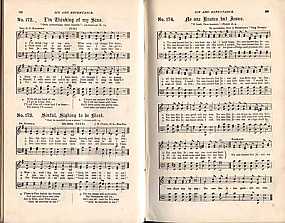My son and I took the thirty mile drive out east to the Amish area of Adams County. Our kitchen table is giving up the ghost and our original set of chairs is now down to two, with two replacements that themselves need replacing. I wanted to see a man about a table. Not some cheap piece of Chinese fiberboard held together by staples and glue, but one built by a man who cared about the wood he selected and the way the lathed spindles felt in his hands. A man whose shop sign read “Wood Craftsman.”
The store itself was not fancy—is anything Amish fancy?—nor was the design of the furniture. But in running my own hands along the same lines that craftsman’s took, I heard the wood singing.
We don’t have the money now to buy that careful, beautiful table. Can’t afford at this moment the chairs that will someday hold our friends and neighbors as we sit around eating the meal I prepare for them. But I liked the man who made that furniture and he’ll get my future business because he understands the nature of what he offers another man.
Down the road was the organic farm. Not too many organic farms in our area, even among the Amish. The young man who ran the place was happy to talk with someone who grasped what he attempted. You could hear the worry in his voice, though. How many other people understood? Who else would come and buy? This was food the way God intended it to be. Food whose cost in dirty hands and sweat made it all the more sweet to eat. One plant mattered because there were so few, so the care taken to preserve what little was in the ground showed in every future bite. This was food that demanded as much care in creating a meal of it as the nurture this young man gave to it.
Walking back to our truck, a flash of red from overhead proved to be a summer tanager alighting on a phone line. My son and I talked for several minutes about that little crimson singer highlighted against the cloudless cerulean sky.  The sun at just the proper angle, the tanager’s feathers glowed in the rays as it warbled. I made sure to ask my son if God was pleased by that little bird He’d made. He gave me a “yes” and together we watched the summer tanager until it darted into the gently swaying oaks.
The sun at just the proper angle, the tanager’s feathers glowed in the rays as it warbled. I made sure to ask my son if God was pleased by that little bird He’d made. He gave me a “yes” and together we watched the summer tanager until it darted into the gently swaying oaks.
Later that evening back near our pond, I spotted the summer’s cousin, the scarlet tanager, with its black wings and vibrant red hue, a red that puts the summer’s palette to shame. With the tops of the trees yellow in the setting sun, I glanced back to catch the iridescence of an indigo bunting flitting through the walnut trees, and I thanked God for the birds He created that bless us with their beauty and song.
The Enemy’s work is to oppose God. How does he best accomplish that task? By destroying meaning.
You can’t read God’s prescription for the construction of the Tabernacle and the making of the priestly garments in Exodus without noting a few choice descriptions:
You shall make a mercy seat of pure gold. Two cubits and a half shall be its length, and a cubit and a half its breadth.
—Exodus 25:17 ESVYou shall make a lampstand of pure gold. The lampstand shall be made of hammered work: its base, its stem, its cups, its calyxes, and its flowers shall be of one piece with it.
—Exodus 25:31 ESVYou shall make for the breastpiece twisted chains like cords, of pure gold.
—Exodus 28:22 ESVMoreover, you shall make the tabernacle with ten curtains of fine twined linen and blue and purple and scarlet yarns; you shall make them with cherubim skillfully worked into them.
—Exodus 26:1 ESVAnd you shall make holy garments for Aaron your brother, for glory and for beauty. You shall speak to all the skillful, whom I have filled with a spirit of skill, that they make Aaron’s garments to consecrate him for my priesthood. These are the garments that they shall make: a breastpiece, an ephod, a robe, a coat of checker work, a turban, and a sash. They shall make holy garments for Aaron your brother and his sons to serve me as priests. They shall receive gold, blue and purple and scarlet yarns, and fine twined linen. “And they shall make the ephod of gold, of blue and purple and scarlet yarns, and of fine twined linen, skillfully worked.”
—Exodus 28:2-6 ESV
The gold used to make the tabernacle wasn’t just gold. It was pure gold.
The lampstand’s construction wasn’t from this bit and that. It was in one piece.
The garments made for Aaron weren’t just clothes. They were glorious, beautiful, and holy.
And the linen that compromised them wasn’t just linen. It was fine linen.
Most of all, the creators of those items weren’t just workers. They were skilled workers.
While it may be true that to the pure all things are pure, I wonder how many of us in the Church today still understand that the sacred has an enduring quality. That which is cheap and meaningless will not endure, but those things that are consecrated and sacred before God are not forgotten in this life or the life to come. The sacred is costly. To make the Tabernacle cost the Hebrews. They surrendered up their gold, jewels and yarns. But more than that, their artisans surrendered up their time and skills to craft something precious. Gold is easy to refine. Pure gold is not.
Yes, the craftsman’s work honors God. If the Reformation taught us nothing more, we should should remember that all the Reformers understood that craft is blessed by God; therefore our work is sacred when it harbors meaning within it.
But this is not a call to buy that Bang & Olafsen audio system instead of the Emerson. If life is nothing more than consuming and buying, then we have fallen for the greatest of the Enemy’s lies; we have cheapened what it means to be alive.
The American Church’s wholesale abandonment of that which is sacred and infused with meaning for that which is cheap has taken a terrible toll. Our attempts to prove culturally relevant have shown that we value what is cheap over what has meaning, rather than going the opposite way of the world.
- The pastor downloads his sermon off the Internet. Cost to him? Nothing.
- The worship leader thinks about the morning’s music the night before. Cost to him? Nothing.
- Communion that Sunday consists of some mass-produced wafers out of a plastic bag and a gallon of grape juice from Dollar General. The cost…?
Does it matter? Yes, it does—it matters more than we can know this side of Eternity.
So much of what we do as a Church in this country is devoid of meaning. We’ve allowed the Enemy to strip out so many simple and sacred aspects of life that we didn’t notice they’d gone missing one by one until it was too late. Our wholesale chasing after the culture rather than being the counterculture that holds onto meaning and sacrament left the unsaved scratching their heads as to what we really offered. If it were possible, some might contend that we who are the representatives of Christ have treated our the Lord as if he’s just some cool guy who lavishes meaning by giving us what we want. We’ve taken our own lazy lust for the cheap and cheapened our birthright as Sons of the Living God. No wonder the world looks elsewhere for meaning! If we as the Church can’t be trusted to lift up the name of Jesus, what then is truly sacred?
No thankfulness exists for the cheap. The sacred though, commands our thanks. When we receive a costly gift and understand its cost, how can we not be grateful? The heart of the Christian should incline toward thanks because only the Christian understands the depth of the cost Christ paid for our sin. Yet our wholesale abandonment of meaning in other aspects of life makes it all too easy for us to do the same with Christ’s atoning work. Our thankfulness shifts to become the pitiful cry of “So Jesus, what have you done for me lately?” And all meaning in life suffers in that wake.
The sparrow falls to the ground and God knows it because He created it. We, on the other hand, pass by without caring. What is another bird to us? Or another tree? Or for that sake, another person? We Christians may stand against abortion, but why is it that all other aspects of life hold so little value to us that we can overlook them so easily? Our picking and choosing looks more like picking and choosing than a consistent worldview that understands meaning in light of the whole Gospel.
As believers in Jesus Christ, we are a priesthood. As a priesthood, we are charged with conserving that which is sacred. But our focus has been so narrow in that regard that we’ve let the bulwarks fall without thinking and let the enemy saunter up to our gates to assault the very heart of the fortress. Tree, bird, horse, man, Christ? Who cares, right? The latest iPod’s come out!
But redemption offers us true change:
- Opening our homes to our neighbors has meaning.
- Slowing down to catch the sunrise has meaning.
- Listening to our elders tell the stories of our families has meaning.
- Caring for a dying parent when it is so easy to let someone else do it for us has meaning.
- Taking the time to listen has meaning.
- Making something with our hands when it can be bought at WalMart for less has meaning.
- Wondering at the splendor of a scarlet tanager has meaning.
- Passing onto another generation the God-soaked sacredness of so many aspects of life has meaning.
- Making a homecooked meal from the plants we harvested and the animals we raised has meaning.
- Creating objects of beauty has meaning.
But most of all, being thankful as we experience God and worship Him in every fragment of our day has meaning. How did we in America let the Enemy so easily rob us of the sacramental?
***
Other posts in the “Unshackling the American Church” series:
- “Unshackling the American Church” Series Announcement
- Unshackling the American Church: The Tyranny of Modernism
- Unshackling the American Church: The Sacramental
- Unshackling the American Church: Treasuring the Creator’s Handiwork
- Unshackling the American Church: Cultivating Essential Beauty
- Unshackling the American Church: Fraternitas
- Unshackling the American Church: Mammon

 The chord transitions from major to minor keys are lovely and the production on the CD is exquisite. Best of all, because the phrasing is simple and the meter consistent, it is easy to sing, unlike many of today's recent worship music offerings. And the tune is so adaptable that you could sing a thousand other old hymns to it, including "Amazing Grace."
The chord transitions from major to minor keys are lovely and the production on the CD is exquisite. Best of all, because the phrasing is simple and the meter consistent, it is easy to sing, unlike many of today's recent worship music offerings. And the tune is so adaptable that you could sing a thousand other old hymns to it, including "Amazing Grace." With the blogosphere alive with the talk of the gifts of the Spirit and their existence or non-existence today, I’d like to discuss a sticking point that has long dogged the issue of modern day charismata: revelation.
With the blogosphere alive with the talk of the gifts of the Spirit and their existence or non-existence today, I’d like to discuss a sticking point that has long dogged the issue of modern day charismata: revelation.